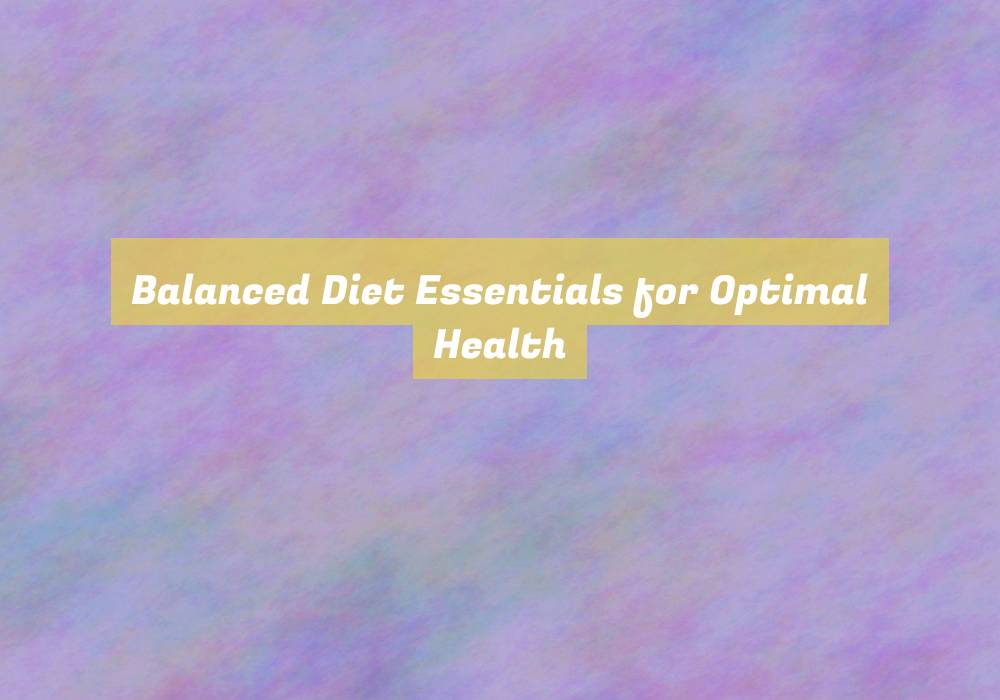Balanced Diet Essentials for Optimal Health
You might think that achieving optimal health through diet requires a complete overhaul of your eating habits, but the truth is, itG??s simpler than you think. By focusing on a few key principles, you can make significant strides in improving your overall well-being.
From understanding the importance of macronutrients to the role of hydration and the incorporation of a variety of foods, a balanced diet is the cornerstone of a healthy lifestyle.
But what exactly are these essential components, and how can they impact your health and vitality?
Importance of Macronutrients
Understanding the role of macronutrients in your diet is essential for maintaining a healthy and balanced lifestyle. Macronutrients, namely carbohydrates, proteins, and fats, are the primary sources of energy and building blocks for your body.
Carbohydrates provide quick energy for your daily activities, while proteins are crucial for repairing and building tissues. Fats, despite their bad reputation, are vital for absorbing certain vitamins and providing a backup source of energy.
Balancing these macronutrients is key to supporting your overall health and well-being.
Carbohydrates, found in foods like fruits, vegetables, and grains, should form a significant part of your diet to fuel your body and brain. Proteins, abundant in sources like meat, dairy, and legumes, aid in muscle repair and growth. Healthy fats, such as those in avocados, nuts, and fish, contribute to heart health and overall bodily functions.
Understanding the importance of these macronutrients empowers you to make informed choices about what you consume, ensuring that your body receives the essential nutrients it needs to thrive.
Essential Micronutrients
Balancing your macronutrient intake is crucial for maintaining a healthy lifestyle. Now itG??s time to explore the importance of essential micronutrients in supporting your overall well-being.
Micronutrients, including vitamins and minerals, are essential for various bodily functions such as metabolism, immune system support, and overall growth and development. These micronutrients arenG??t produced by the body and must be obtained through your diet.
Vitamins play a crucial role in maintaining health. For example, Vitamin A supports vision and skin health, Vitamin C boosts immune function, and Vitamin K aids in blood clotting.
Minerals such as calcium, magnesium, and iron are also essential for different bodily functions. Calcium is important for bone health, magnesium is necessary for muscle function, and iron is involved in transporting oxygen in the body.
To ensure that you receive an adequate intake of essential micronutrients, itG??s important to have a balanced diet rich in fruits, vegetables, whole grains, and lean proteins. However, itG??s also important to be mindful of potential deficiencies and consider supplementation if necessary.
Role of Hydration
Staying hydrated is essential for supporting various bodily functions and maintaining overall health. Water is crucial for regulating body temperature, transporting nutrients, and lubricating joints. When youG??re not properly hydrated, your body canG??t perform these functions optimally, leading to potential health issues.
Dehydration can cause headaches, dizziness, and fatigue, and in severe cases, it can even lead to organ failure. To maintain proper hydration, itG??s important to drink an adequate amount of water throughout the day. The general recommendation is to drink eight 8-ounce glasses, which is about 2 liters, of water per day, but individual needs may vary based on factors such as activity level, climate, and overall health.
ItG??s also important to consume hydrating foods, such as fruits and vegetables, which can contribute to your overall fluid intake. Additionally, be mindful of increased water needs during exercise, illness, or hot weather. By staying properly hydrated, you can support your bodyG??s essential functions and promote overall health and well-being.
Incorporating Variety in Diet
To maintain a balanced diet, itG??s important to incorporate a variety of foods from different food groups to ensure that youG??re getting a wide range of nutrients. Each food group offers unique benefits, so including a variety of fruits, vegetables, whole grains, lean proteins, and healthy fats in your diet is crucial for optimal health.
Fruits and vegetables provide essential vitamins, minerals, and fiber, while whole grains offer sustained energy and important nutrients. Lean proteins, such as poultry, fish, beans, and nuts, are vital for muscle health and overall body function. Healthy fats from sources like avocados, olive oil, and nuts support heart health and aid in the absorption of fat-soluble vitamins.
Incorporating a variety of foods also helps to prevent dietary boredom and ensures that youG??re receiving a wide array of flavors, textures, and nutrients. Experimenting with different types of foods can make mealtime more enjoyable and can introduce you to new ingredients that you may come to love.
Remember that a diverse diet not only contributes to physical health but also promotes overall well-being.
Conclusion
So, take care of your body by eating a variety of whole foods that provide the essential nutrients it needs.
Stay hydrated, and make sure to incorporate a balance of macronutrients and micronutrients into your diet.
With these simple steps, you can achieve optimal health and well-being.
Remember, itG??s all about balance and moderation.
Keep up the good work!





